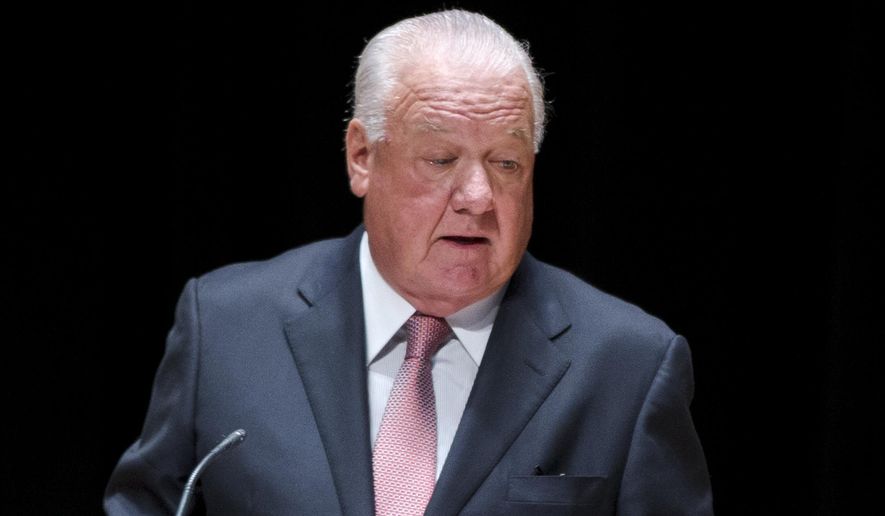PHILADELPHIA (AP) — Bill Cosby, once the very public pride of Temple University, parted ways with the school last year amid allegations that he had drugged and sexually assaulted women. Now that his own words show behavior that was at least unsavory, his lawyer is feeling heat for continuing to serve as the chairman of the university’s board of trustees.
In deposition testimony taken a decade ago and made public this month, Cosby acknowledged giving quaaludes to women with whom he wanted to have sex — adding evidence that his lawyer, Patrick O’Connor, knew that Cosby had behaved in a way that could reflect badly on the university.
The president of the university’s faculty union is calling for O’Connor, currently chairman of the trustees, to step down, but university officials are standing behind O’Connor. A half dozen trustees contacted by The Associated Press wouldn’t comment on the situation, though one, Joseph W. Marshall 3rd, expressed “full support” for O’Connor. Experts are split on whether O’Connor’s work for Cosby constituted a clear conflict of interest.
“In my experience, the highest standards of ethical behavior and the best interest of Temple have always guided the chairman’s leadership and relationship to the university,” Temple President Neil Theobald said in a statement this week.
Temple is a public university with a history of helping underprivileged students from Philadelphia — such as Cosby — do better in life.
Cosby was the public face of the school for decades. He was a student there in the 1960s, left school to find fame as a comedian and actor and later returned to earn his degree.
Temple was always the academic home for the celebrity who championed education. He became a Temple trustee in 1982. According to a review of minutes, he attended just one board meeting over the next 32 years, but he was an active booster who wore Temple shirts on his 1980s his sitcom “The Cosby Show.”
He stepped down from the trustees board in December as public pressure grew when more than two dozen women came forward accusing him of drugging and sexually assaulting them. He didn’t give his customary graduation speech this year.
The first public accusations came more than a decade ago from Andrea Constand, a Temple employee who sued Cosby and later settled for undisclosed terms.
This month, testimony from Cosby’s depositions in that case has been made public. In his sworn statements made in 2005 and 2006, he said that in the 1970s, he had prescriptions for quaaludes, a powerful sedative that was later banned in the U.S., and gave them to women with whom he wanted to have sex. He has denied giving the drug to anyone without their knowledge and says he has not raped anyone.
Cosby has not been charged with any crimes, though he is the subject of a recent criminal investigation in California and a pending civil lawsuit in Massachusetts.
O’Connor rose from a working-class family in Wilkes-Barre, Pennsylvania, to become one of the first partners at what’s now known as Cozen O’Connor, a law firm that ranks among Philadelphia’s largest. O’Connor served on the Temple board from 1971 to 1984 and returned in 2001. He has been the chairman since 2009.
Jerry Reisman, a Garden City, New York, lawyer who has experience in the duties of nonprofit boards, said there’s no doubt that O’Connor should have resigned from Temple’s board when he began to represent Cosby in the Constand lawsuit.
“O’Connor failed,” Reisman said. “It was an error in judgment on his part. It was a conflict, and he should have represented it as a conflict.”
Charles Elson, director of the John L. Weinberg Center for Corporate Governance at the University of Delaware, said it’s not an easy call that O’Connor should step down.
Under Temple’s policies, trustees are supposed to notify the university of potential conflicts. By contrast, lawyers are duty-bound to their clients to keep their secrets.
O’Connor has not responded to telephone and email messages from The Associated Press, but he told The Philadelphia Inquirer this week that he did not have a conflict working for Cosby.
The university said in a statement that O’Connor’s work for Cosby “was disclosed and vetted.” The university said O’Connor’s work for Cosby was finished after the settlement with Constand in 2006, though it resumed this year when the AP sued to unseal records from the case.
After Cosby’s statements were detailed in news reports, Arthur Hochner, an associate professor in Temple’s business school and the president of the Temple Association of University Professionals, a union representing faculty, said O’Connor should resign.
“I don’t think he can actually defend himself in this conflict of interest,” Hochner said. “I’m really concerned about Temple and its reputation and its students and its employees. I don’t think it’s a tenable situation.”
He said it would also be troubling if other board members approved of his working for Cosby in the case. “If they knew about this and cleared it, I question their judgment as well,” Hochner said.
___
Mulvihill reported from Haddonfield, New Jersey.




Please read our comment policy before commenting.